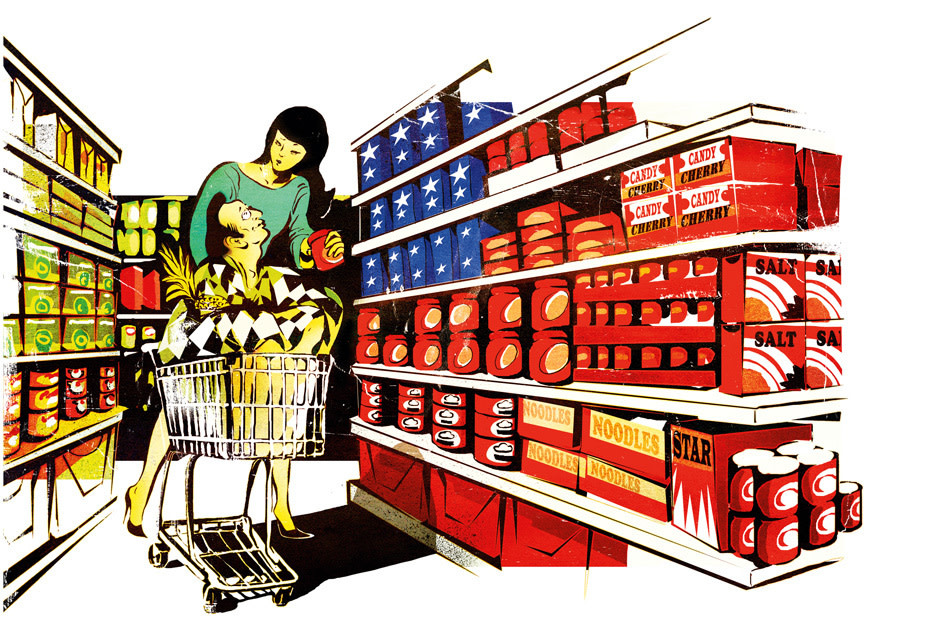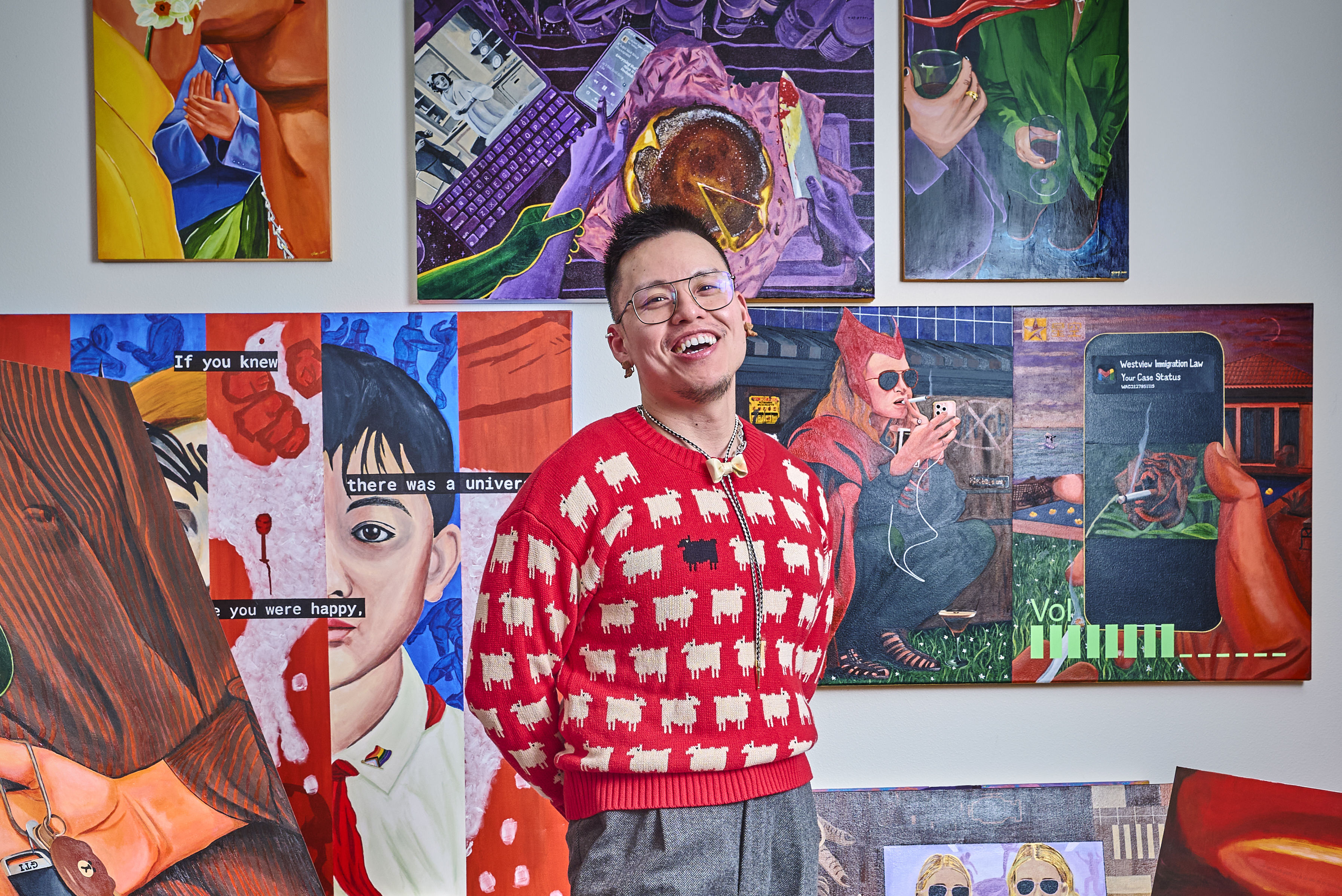The Grocery Store Cart

Michiko pushed the grocery cart down the aisle, marveling at how it was so large you could put a dead body in it. She peered at the strange packages on the shelves, sounding out unfamiliar English words on the labels and trying to decide what she could choose that was both edible and would take up space in the cart. She lingered in front of Skip-py, wondering if the brown stuff in the jar was some kind of dog food and thinking of her little dog Poppy, who had nipped her for the very first time before she’d left Japan, and when she turned around her father was lying in the cart, dressed in his pajamas and robe, as he had been when she’d found him lying outside the door to the family bath. His English was excellent and he spoke to her in it now, from the dead, as it were, and this is what he said, or at least what she thought he said, as her own English was much poorer than his, an old rattling train compared to his bullet train express. He spoke fast. As she leaned over the cart to listen, she saw a child, being wheeled beside her by his mother, gaping at him with an open mouth and a tongue that hung out like a dog’s.
“Close your mouth,” the child’s mother said. “You’re going to catch a fly.”
“Michiko-chan,” her father said after he waved at the child, and the child waved back. “You didn’t give Watanabe a chance. How can you judge a man by his dislike of the food you cooked? Cook him something better!” Her father paused, and looking up at her from behind the spectacles that were always sliding down his nose but were not sliding now, he said, “Try making him an American meal. There’s food here. Shop, my child!”
Michiko hung her head down. Her father had arranged for her to meet Watanabe with the thought they’d make a good match, and Michiko had tried to like Watanabe. Tried hard. She told her father this but he only said, “Sh! People are listening! It’s not good to have a private conversation here,” and then he fell silent, and shut his eyes, and looked so dead that she feared he’d never come back to life. What’s worse, she had to put the jar of Skip-py in the cart, and where would she put it? On his chest? He fit perfectly into the cart, every part of him, like azuki bean sweets in a sweet box.
“Father!” Michiko cried out but he didn’t respond, and it was all Michiko could do not to shake him, as she’d done when she’d found him slumped outside the door to the bath, his spectacles on (he often read in the bath), his face flushed, as he’d liked his bath water scalding hot. She pushed his shoulder with one finger, as she’d seen a large American woman do to a package of meat, but he batted at her hand. Michiko was so disconcerted that she walked away from him, only stopping when something golden in a bin caught her eye. She ran back with it to the cart and tossed it in and when she dared to look, her father was holding a pineapple in his arms. He patted its bristly head and said, “Did you dislike Watanabe because he was going bald?”
“No!” Michiko said, though it was true, Watanabe had an unprepossessing appearance and a woman liked some dash in a man. She had not asked what Watanabe looked like when her father first informed her he was trying to arrange a match, fantasizing that Watanabe was a well-muscled man who would bestow passionate kisses on her lips, like the heroes in the Harlequin romances she read, which were translated into Japanese by a friend who had divorced her businessman husband after finding a note from a woman in his pants. But Watanabe had been short and balding, with a little pot belly. Due to either nerves or allergies, he sniffed a lot. They had gone to Aoyama cemetery at the peak of cherry blossom season, when the branches hung with plump pink blooms, but Watanabe, oblivious to their swollen beauty, had hurried her toward Aoyama fire station just outside the cemetery grounds, where he gazed admiringly at the shiny red fire engine parked outside. He loved motor vehicles. He talked about them a lot.
“Excuse me,” a woman said from behind Michiko.
“I’m sorry!” Michiko saw that she was blocking the aisle, and pushed her cart to the side.
“What are you going to do with that pineapple?” the woman asked as she pushed her own cart by.
“Cook it with ham,” Michiko’s father replied.
The woman waited for Michiko to answer. She didn’t seem to see Michiko’s father in the cart.
“Where are you from?” the woman asked.
“Japan.”
“This is a nice juicy ripe fruit,” Michiko’s father said. He gave the pineapple a squeeze. “You don’t see many of these in Japan.” He patted the stiff leaves atop its head, as he had rarely patted Poppy, who, he claimed despite evidence to the contrary, was a flea-ridden dog. Poppy had started barking after Michiko found her father outside the bath and didn’t stop until a veterinarian in Kichijoji plunged a tranquilizer into her rump, knocking her out for 24 hours. She woke up a different dog.
“I’ve never bought a fresh pineapple before,” the woman said. “Are they hard to peel?”
Michiko didn’t know what “hard to peel” meant. “Yes,” she said.
Her father had always told her that she had a good ear for English, but that she didn’t understand the meaning of half of what she heard. “You don’t study hard enough,” her father used to say, but now he didn’t say anything at all. He had a blissful look on his face, as if lying on his futon instead of in a grocery cart. He looked as if he lay in carts, holding pineapples, all the time.
“I suppose I should be more adventurous in my diet,” the woman said. She turned and grabbed a package of meat from her cart, the same package, Michiko realized, and the same large woman who had earlier poked it. “Tonight I’m going to cook sloppy joes. My mother loves them. She’s 90 years old but she’s reverting to her childhood. She gums her food, but she can still chow down a sloppy joe. It just takes her a while.”
“I had my teeth right until the end,” Michiko’s father said. “I died with all my teeth in my mouth. The last meal I had was buckwheat noodles but it could have been something harder to chew and I would have been all right. I could probably bite through this pineapple. Especially,” he sniffed its round bottom, “because it’s ripe.”
“My mother lives in the past,” the woman said. “She thinks my father is still alive. You know, if that pineapple were smaller it would look a lot like a grenade, but then if I were smaller I’d look like Raquel Welch.”
“Do you ladies need help?” a store clerk suddenly asked. “Are you finding everything?”
“She might need help finding something to eat with that pineapple,” the woman said, nodding at Michiko.
“Margaret cooked pineapples with ham,” Michiko’s father said.
“Holler if you need help,” the clerk said. “Have a nice day!” He straightened some things on a shelf, then strode off.
“Who’s Margaret?” Michiko asked her father, but he didn’t reply. A month before he’d died she’d overheard him talking, and at first she’d thought he was talking to himself.
“Margaret,” he said, “why did you die before I saw you one last time?”
Michiko had peeked through a gap in the sliding door at her father, squatting in front of Poppy, who was looking at him with her ears pitched forwards, her eyes intent on something he held in his hand. A piece of pork. A piece of Chinese-style pork, simmered for four hours in a broth flavored with ginger root and green onions and then sliced thin and served with hot mustard sauce. Michiko knew this because she’d made the pork herself. Her father loved her Chinese pork. But he was feeding it to the dog, who, the vet said, needed to be walked more and put on a diet. “See this?” the vet had said, squeezing Poppy’s freckled, paunchy belly. “That’s fat.” Michiko waited for Poppy to bite the vet. She had wanted to bite him herself.
“Father!” she almost cried out, but her father looked so happy squatting there, as he had sometimes done with Michiko as a child when they were waiting for the bus to take them to Mother, squatting comfortably and holding out the succulent pork to Poppy, who wolfed it down with grunts of pleasure.
“You’ve been holding that jar of peanut butter a long time,” the woman said. “May I?” Michiko handed her the jar.
“Chunky salted. My father ate it with strawberry jam.” The woman put the jar in her own cart. Michiko didn’t ask for it back. Perhaps the woman’s father was lying there, holding the jar of peanut butter. Perhaps everyone in the store was wheeling around someone dead in their carts. She was sorry she had fled the sight of her father’s calligraphy brushes, lined up on a table in his empty bedroom next to the little black ink pot from which the ink was fast evaporating. She wanted to return to their house in Japan.
“How do you say ‘peanut butter’ in Japanese?” the woman asked. “Don’t be tongue-tied. I talk a lot, believe me, I know. I can even talk in the dentist’s chair with his instruments in my mouth.”
After Michiko’s father had died, after his ashes and bones were in the urn, after Poppy had been tranquilized and then revived with seemingly no interest in ever again sitting in Michiko’s lap, Michiko had done the boldest thing ever in her life. She called Watanabe. When he answered, she almost hung up out of shyness and fright but finally gasped out her name and asked if he might be so kind as to meet her if he had time. Watanabe sounded wary, and surprised, and at first she was sure he would refuse, as she had refused his invitations over the months, that he would even hang up. But in the end he’d said yes, and she’d soon found herself sitting across from him in Anna Miller’s pie shop in Aoyama, where he’d eaten two slices of banana cream pie and talked, to her surprise, rather easily to her about movies she liked. Afterward they’d strolled around looking into shop windows at the kimonos, the carved hair ornaments, the designer shoes that could not, Michiko was sure, fit any mortal’s feet. “I’m very sorry about your father,” he finally said as they were eyeing a row of cakes frosted with roses in a bakery window. She burst out crying. He’d sniffed as if about to cry too, then pressed a handkerchief in her hand.
“Larry said I could have been a ventriloquist,” the woman said. “He’s not my dentist, he’s my boyfriend.”
Michiko’s father appeared to be dozing. The pineapple rested against the side of his head, its bottom in the hollow of his neck.
“It’s hard for a man to be with a woman who’s taking care of her elderly mother. It’s not like we have much privacy, or time.”
“I … ” Michiko began, but the woman went on, “We only get away once a week, when the respite worker comes. We go shopping. But half the time Larry sits in the car reading Auto Racing magazine.”
“Her boyfriend likes cars,” Michiko’s father said sleepily.
“He isn’t my boyfriend.”
“You have a boyfriend?” the woman asked.
“Yes,” Michiko said. “I mean no.”
“I understand. It’s an on and off romance. Sometimes I get upset with Larry for staying in the car, but he says it’s boring for him in the store because I gab with every soul in sight. Wait until I tell him I met someone from Japan. He’ll be sorry he didn’t come with me inside.”
“I took care of my father,” Michiko said, but the woman interrupted again. “Can you say something in Japanese?”
Michiko’s face felt hot. She hated how her emotions flamed up, how embarrassed she got.
“I’d love to hear Japanese,” the woman urged her. “Don’t be shy.”
“Hattori-san dou omotte?” The line, from a movie, but which one? It had just sprung out of her mouth.
The woman’s face lit up. “Isn’t that something!” she said. Michiko could see the pretty girl this woman had once been shining from her fleshy face. She could see her hunger, her eagerness for life, and where had her own gone? She leaned over her father. “Who’s Margaret, Father? Tell me. I want to know.”
“You met her. You were 7. I took you to New York. You said Margaret was pretty. You held her hand.”
“No I did not.”
“I talk to myself all the time,” the woman said. “That’s why I keep busy filling up my grocery cart. I fill it with boxes of crackers and macaroni and cheese and Captain Crunch cereal, which I don’t even like that much. I hide the diapers for my mother under everything else.” She leaned over her cart and started moving things around.
“My father liked to speak English,” Michiko said. “He preferred it to his mother tongue. I never asked him why he liked English so much.” Even though she was staying nearby, with a college roommate who had immigrated to Oregon, she wouldn’t come to this store again, but then she didn’t know how she could leave her father lying in the cart. If only somebody saw him and screamed in surprise. If only somebody said there’s a man wearing spectacles and a bathrobe lying in your cart. But people walked by without looking at Michiko’s father, or at Michiko. They didn’t notice her. She had not been noticed, except by Watanabe-san, who had looked stricken when she’d told him she was leaving Japan for an “indefinite amount of time.”
“I feel like I’m burying my mother under all these things in my cart,” the woman said. “The truth is, I get so tired taking care of her that sometimes I wish she would die. Does that make me a bad daughter?”
“Hattori-san dou omotte?” Michiko said. “That’s what the father said to his daughter in that movie. It means, ‘Do you like Mr. Hattori?’ But it didn’t matter, because Mr. Hattori was already engaged to somebody else. My father knew all the lines from Ozu’s films. I think he wanted to be a movie director. He didn’t want to be a museum director at all.”
“That’s how I met Margaret,” Michiko’s father said. “She was sitting in front of me at the New York Film Festival, eating popcorn. She had red hair in a bun this high.” He waved his fingers over the pineapple. “I couldn’t see the screen. Instead of watching the movie, I watched her big hair, even when the screen got dark.”
“Larry loves the movies,” the woman said. “His favorite movie is Bonnie and Clyde.”
“Beautiful hair,” Michiko’s father said. “Her pride and joy. As you are mine.”
Michiko wasn’t sure exactly what her father had said. Something good. He had said something good about her; he had bestowed rare praise. But now he just looked tired. His dreamy look had been replaced by a weary one, as if death were wearing him out. The pineapple slipped from beneath his chin and rolled into the crook of his arm.
“I cooked pork for my father,” Michiko said. “Some Japanese don’t like meat, but he liked it too much.”
She bent over the cart, but couldn’t bear to touch her father again. Her mother had been ill. She saw things nobody else saw, talked to people nobody else could see. Michiko and her father had gone to visit her, together, when Michiko was a child. Her father always whispered in his wife’s ear. “I miss you,” he must have said. “Come home. We’re waiting. I miss you so much.” Michiko tried to lift the pineapple, but it remained in her father’s arms.
“Take this ham,” the woman said, lifting a hunk of meat from her cart and holding it out.
“Thank you but I can’t.”
“Take it. That pineapple looks lonely by itself. I’m just remembering that Elvis liked pineapple. How could I forget? With marshmallows and maraschino cherries. You can give your father that, but for now, give him ham.” The woman put the ham on top of Michiko’s father’s belly. She gave it a pat, then straightened up. “There’s Larry!” she exclaimed. She tugged at Michiko’s arm, and Michiko looked to where the woman was pointing, down the aisle, but all she saw was a sharp-elbowed teenager scratching his nose and a tattooed woman lifting a box of something from a shelf.
“There’s my Larry canary!” The woman began pushing her cart down the aisle. Michiko pushed her father in his cart, leaning into it with all her weight. She followed the woman; she didn’t know why. At the end of the aisle they turned the corner and there was a giant clad in shorts, standing in front of a pyramid of fruit, with hair all over his face and legs and arms. He tossed an orange in his hand up and down, as if it were a baseball.
“Isn’t he a hunk?” the woman exclaimed. “Isn’t he a dreamboat? Larry!” There was such joy in the giant’s face that Michiko had to look away, and when she did she saw her father lift the package of meat and hold it between his slim hands. “Ham! Now I can find Margaret. I’ll surely find Margaret now that I have pineapple and ham. Watanabe is waiting for you. Go back to Japan.”
“He’s not waiting.”
“Believe me, he is. The dead know things like that.”
“Larry, she’s from Japan!” the woman was saying. “How about that?” Michiko looked at the two of them, with their arms entwined, and for a moment she thought it might be possible to go on without her father, to go forward, to put things in her cart, and later cook them, and, much later, write to Watanabe in Japan. She remembered how he had waved at her when they parted, how, before walking away, she saw a spot of banana cream pie on his shirt that made her smile. “Goodbye, dear child,” her father said, but so faintly that Michiko wasn’t sure he had spoken. When she looked, he had vanished from the cart.
Marian Pierce’s short stories have appeared in GQ, Creative Writers’ Handbook, Scribner’s Best of the Fiction Workshops 1997, and The Japan Times. She won the Frederick Exley fiction competition and has received fellowships from the Iowa Writers’ Workshop, Literary Arts, the MacDowell Colony, and KHN Center for the Arts. Pierce works as a freelance editor and teaches creative writing at Marylhurst University and online for UCLA Extension.




